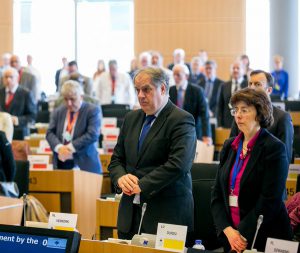
My Independent opponent made a comment in a recent leaflet that we should keep Cambridge City Council elections local and that he was not going to talk publicly about his views in the EU. That set me thinking. I can see his point, but things are much more interconnected than that. At the very least, the stability brought by the EU means local councils don’t have to think about “the war effort” (or the war memorial) as they did in the twentieth century.
On the doorsteps we are a week away from the local elections and the EU referendum is two months away. Support for the Liberal Democrats and for EU membership are (mostly) going together, and there is a phalanx who clearly say they are voting “Independent and out”.
It is easy to talk of the EU and the city council as if they are opposites of the political scale: one international and one local. But the existence of the European Union’s Committee of the Regions should put a question mark over this. It is one of the EU institutions, created under the Maastricht treaty, which brings together people people representing the regions in the EU. It offers a way for the voice of the regions to be heard other than via national governments, and involves people used to thinking from a local and regional perspective in EU decision-making. Its existence is testimony to the care with which EU democracy has been envisioned, finding a nuance way for different voices to be heard — which is a far cry from the Eurosceptics’ charge of it being “undemocratic”.
Where the EU and the local meet for me is in the vision of subsidiarity. This was hard-wired into Jacques Delors approach to EU reform, and means doing centrally only those things best done centrally, and pushing as many decisions as possible as close to the people they affect as possible. When some British politicians get jumpy about a “European superstate” they project onto the EU the centralising approach as we have had in the UK for a long time rather than what actually happens in the rest of the EU.
Pushing decisions as close as possible to the people affected by then also appears in the preamble to the Liberal Democrat constitution. The instincts for internationalism and devolution seem hard-wired into our party mindset, and makes sense for our instinctive support for the EU.
In Cambridge, this means thinking about the local in the European context. This is not about losing sight of the person who has just emailed me about the road surface on Huntingdon Rd, but it is about being willing to learn from mainland Europe — not least about the value of proper consultation and debate in local politics.
But there are also much more detailed things. Cambridge is flat and full of cyclists: what can we learn from cities like Amsterdam about helping cyclists and pedestrians?
The current political climate in the UK means that there are tight limits on what local authorities can spend, which adds to the sense in sharing ideas with other cities because we can’t simply spend our way out of problems.
…….
I could have written much of this post at any point in the last three months, but two things happened recently which have focussed my mind.
One was seeing an announcement from Labour candidate Sadiq Khan that, if he is elected as London Mayor, he will place London on a “war footing” to address terrorism. On the one hand that sounds like hubris as it is the role of the state to defend people, and the role of local government to co-operate with police and security services (and plan have emergency plans). On the other hand, I found myself thinking ahead to a forthcoming residents association meeting. What happens if people ask about terrorism there? This is not primarily a city council issue, but engaging with people’s concerns is the province of anyone elected. In as much as terrorism is fuelled by breakdown in community, what local councils do to build community cohesion is very relevant.
I then saw a tweet from ALDE, the “Alliance of Liberals and Democrats for Europe” about a recent session of the Committee of the Regions, which is engaging with radicalisation. In that context, this becomes “how can we, the peoples of Europe, stand together in the face of extremism?” That isn’t Sadiq Khan’s “war footing” and feels much wiser — drawing on a European heritage of experiencing extremism and finding other ways of being. It is about finding the resources not to be cowed by fear of terrorism or bounced into inflaming the situation by fighting back.
I am not surprised to see ALDE speak out. This began life as a grouping in the European Parliament and is well on the way to functioning as a pan-European political party. It feels absolutely consistent with the Liberal mindset to be thinking together on a Europe-wide level, promoting the local (through the Committee of the Regions) and both finding the courage not to give in to extremism, and seeking to build community in a way that works for everyone.